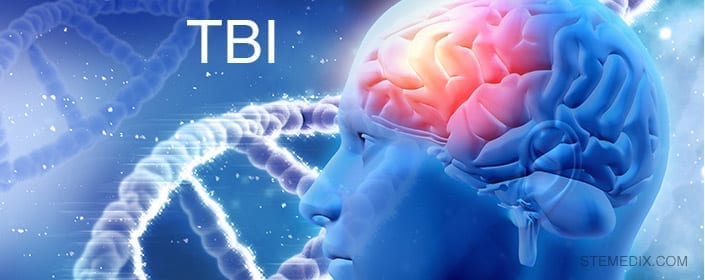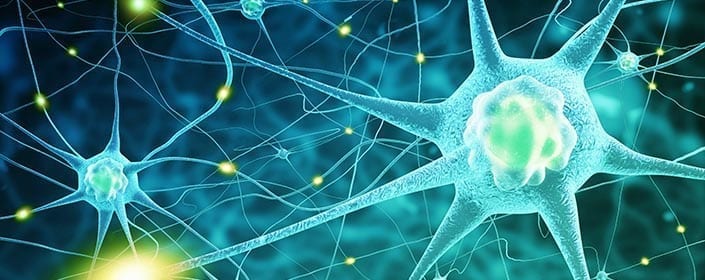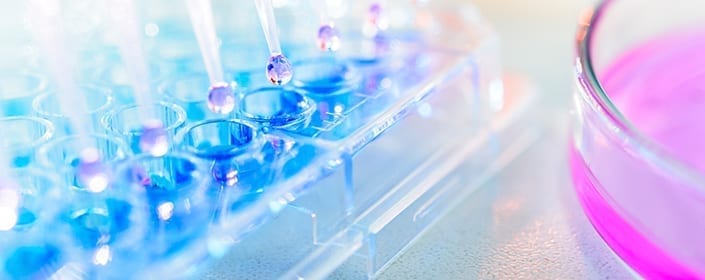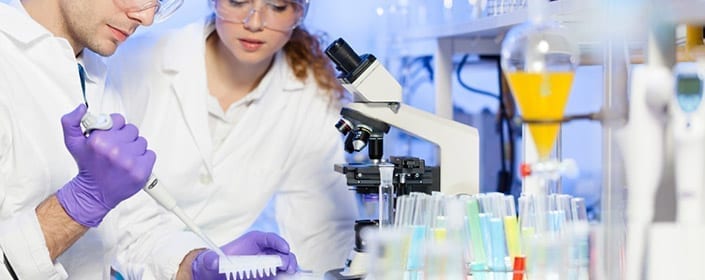
by admin | Mar 13, 2017 | Studies
Researchers have recently shown how a specific type of stem cell, called umbilical cord mesenchymal stem cells, can improve the neurological function of patients who have experienced traumatic brain injury (TBI). When TBI occurs, the trauma to the head leads the immune system to send cells to the area of injury. The resulting swelling often overwhelms the site of injury, which can cause significant damage to the tissue as a number of brain cells, or neurons, die. The rationale for using stem cells to treat TBI is therefore that by replacing these lost neurons, the functions that are lost as a result of TBI may be restored.
In the current study, published in the journal Brain Research, scientists studied 40 patients who had experienced TBI. Half the patients were selected to act as a control, receiving no treatment, while the other half was given 4 transplantations of umbilical cord mesenchymal stem cells through the spine. All 40 patients were evaluated both before any treatment was administered, as well as 6 months later. Specifically, each patient underwent the Fugl-Meyer Assessments (FMA), which assesses balance, motor functioning, and sensation, as well as the Functional Independence Measures (FIM), which tests both motor and cognitive functioning.
Though the control group of patients who did not receive any medical intervention did not improve in their FMA and FIM assessments over the 6 month period, the patients who received the stem cell transplants improved on both measures of functioning. In the FMA, improvements were observed in scores for upper extremity and lower extremity motor performance as well as for balance and sensation. In the FIM, a number of scores increased over the 6 month period for the treatment group, including those for self care, mobility, locomotion, communication, and social cognition.
These results demonstrate the great promise of stem cells generally – and of umbilical cord mesenchymal stem cells specifically – for the treatment of symptoms resulting from TBI. Further studies will be needed to help clarify the specific ways that these stem cells may be able to help patients who have suffered a TBI, and studies that involve multiple centers and larger sample sizes of patients are likely to occur in the future to help in the development of relevant treatments.
Both Hyperbaric Oxygen (HBO) treatment and Mesenchymal Stem Cells (MSC‘s) have been used as interventions for patients suffering from Traumatic Brain Injury (TBI). Find out more in this article.
Reference
Wang, S. et al. (2013). Umbilical cord mesenchymal stem cell transplantation significantly improves neurological function in patietns with sequelae of traumatic brain injury. Brain Research, 1532, 76-84.

by admin | Dec 20, 2016 | Studies
Scientists have now shown that combining human stem cells with a specific protein can help the stem cells turn into neurons, thereby reversing brain damage associated with stroke. The research team, led by Berislav Zlokovic at the Keck School of Medicine at the University of Southern California, published their findings in Nature Medicine in August.
The protein, 3K3A-APC is a variant of a protein normally found in the human body called activated protein C (APC). APC has both cell signaling activity and anticoagulant activity that minimizing bleeding. The 3K3A-APC variant maintains the cell signaling capacity but minimizes the anticoagulation associated with APC. This variant has been demonstrated to improve a number of health-related problems, including a number of pathologies related to the brain. Brain trauma and multiple sclerosis, for instance, have been improved through the use of 3K3A-APC.
One week after inducing stroke in a group of mice, Zlokovic and his colleagues administered put human neural stem cells in the area of the brain that had been damaged. Over the course of seven days, they then administered 3K3A-APC to one group of mice and a placebo solution to second group. The mice who received the protein in addition to the stem cells had 16 times more stem-cell derived neurons than those who received the stem cells alone.
Even more promising than the growth of neurons was that the neurons became functional, connecting with other parts of the nervous system, just as the neurons that were lost due to stroke would have, and restoring motor and sensorimotor performance in these mice. Performance on tasks such as walking on a rotating rod and removing tape from the forepaw was significantly better in the mice who received the protein than in those that did not. To ensure that the recovered functioning was a result of the stem cells, the scientists employed a toxin that rid the brain of neurons that were derived from the stem cells and saw that the improvements were then reversed.
The United States Food and Drug Administration (FDA) has already approved the use of the APC protein in clinical stroke studies, and it is currently being used in a Phase II clinical trial at the National Institutes of Health. In the trial, the protein is being used in patients who have suffered from an ischemic stroke in the past few hours. Zlokovic and his colleagues are hoping to initiate a similar trial to test the effects of the stem cell 3K3A-APC combination in patients who have suffered from stroke. The work Zlokovic has already completed, as well as related work by others, signals that there is great potential for stem cell therapy to restore brain tissue as well as normal functioning in stroke patients.
Learn more about treating post stroke syndrome with stem cells.
Reference
Wang, Y. et al. (2016). 3K3A-activated protein C stimulates postischemic neuronal repair by human neural stem cells in mice. Nature Medicine, 22(9), 1050-1055.

by admin | Feb 29, 2016 | Stem Cell Research, Studies
Scientists have identified a new way to treat disorders of the brain using stem cells. Their proposed technique is particularly promising because of the ability of stem cells to cross the blood brain barrier, a barrier that has posed challenges for other drug candidates.
A recent review published by Rutgers University’s Pranela Rameshwar and colleagues supports the notion that stem cells, and particularly, mesenchymal stem cells (or MSCs) may be great drug delivery vehicles for people with neurological diseases such as Alzheimer’s disease, Parkinson’s disease, traumatic brain injury, and certain forms of brain cancer. Therapies that are currently used suffer a number of limitations that could potentially be overcome by stem cell delivery of drugs.
Not only are several drug substances unable to cross the blood brain barrier, but drugs can also have unwanted toxic effects because it is difficult to specifically target their action to the areas where they are needed. Stem cells can help ensure that drugs are delivered specifically to the brain, and perhaps even to the specific parts of the brain where the drug could be helpful. The use of stem cells could also circumvent the need to perform highly invasive surgical procedures to address neurological diseases.
Though different types of stem cells could theoretically be used to deliver therapies to the brain, mesenchymal stem cells appear highly valuable because research has shown them to be safe. Unlike other forms of stem cells, MSCs do not tend to form tumors and also preferentially migrate to parts of the brain in need of new tissue. An additional advantage of MSCs is that their use is not subject to the same ethical scrutiny as some other stem cells. Now that the therapeutic potential for MSCs has been identified, relevant research efforts will undoubtedly increase, with the hopes of translating this promising therapeutic approach into practice.
Learn about the use of adipose stem cells to treat brain injury here.
Reference
Aleynik, A., Gernavage, K. M., Mourad, Y., Sherman, L. S., Liu, K., Gubenko, Y. A., & Rameshwar, P. (2014). Stem cell delivery of therapies for brain disorders. Clin Transl Med, 3, 24. doi: 10.1186/2001-1326-3-24

by admin | Sep 13, 2015 | Stem Cell Research, Studies
In their article, Neurogenic differentiation of murine and human adipose-derived stromal cells, Kristine Safford and colleagues provide evidence for a new candidate for brain therapies. Much of our body’s tissue is able to regenerate to repair itself following injury. However, brain tissue, or neural tissue, does not have this capacity. It has therefore been a priority for medical researchers to identify strategies for repairing damaged brain tissue.
Certain cells, such as embryonic stem cells, can be treated so that they turn into brain cells. However, because it is difficult to access these types of cells, there has been an ongoing search for other ways to create neural tissue for therapeutic purposes. In this publication, the researchers share their finding that fat tissue, or adipose tissue, from adults, may be able to serve this function. Here, the researchers demonstrate that they were able to induce adipose-derived stem cells to undergo alterations that resulted in cells resembling brain cells, or neurons. The researchers were able to change both the shape and chemical features of adipose-derived stem cells so that these aspects of the cells were consistent with those of normal neurons.
This study provides a new therapeutic candidate for brain injury. Ongoing research that aims to determine whether adipose-derived stem cells can be used to develop mature neurons that function appropriately as neurons will clarify whether adipose-derived stem cells will indeed eventually be able to be used to treat specific brain injuries or abnormalities.
Learn more about treating brain disorders with stem cells.
Source
Safford, K.M. et al. Neurogenic differentiation of murine and human adipose-derived stromal cells. Biochem. Biophys. Res. Commun. 294, 371-379





 St. Petersburg, Florida
St. Petersburg, Florida
